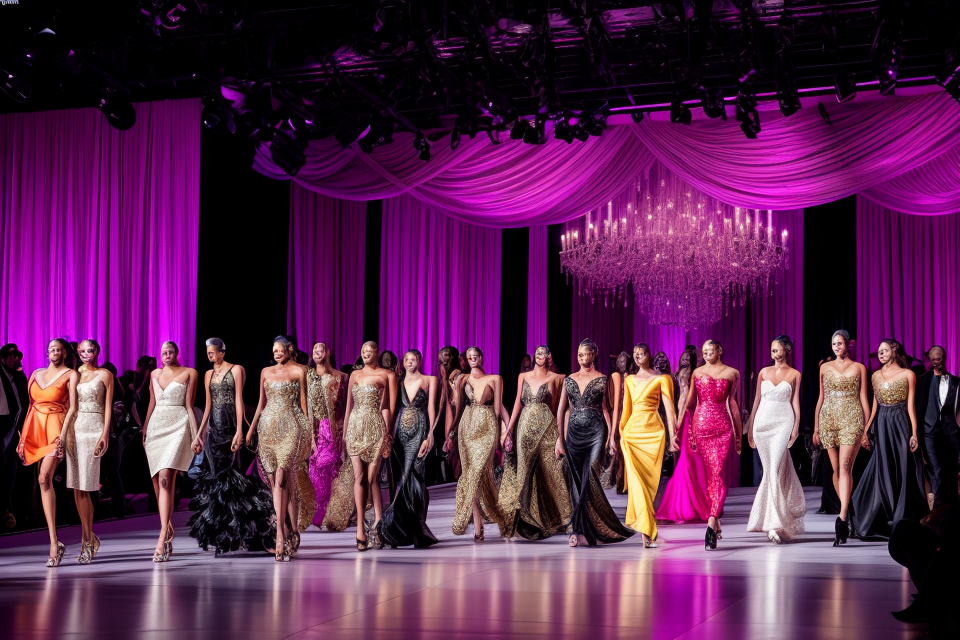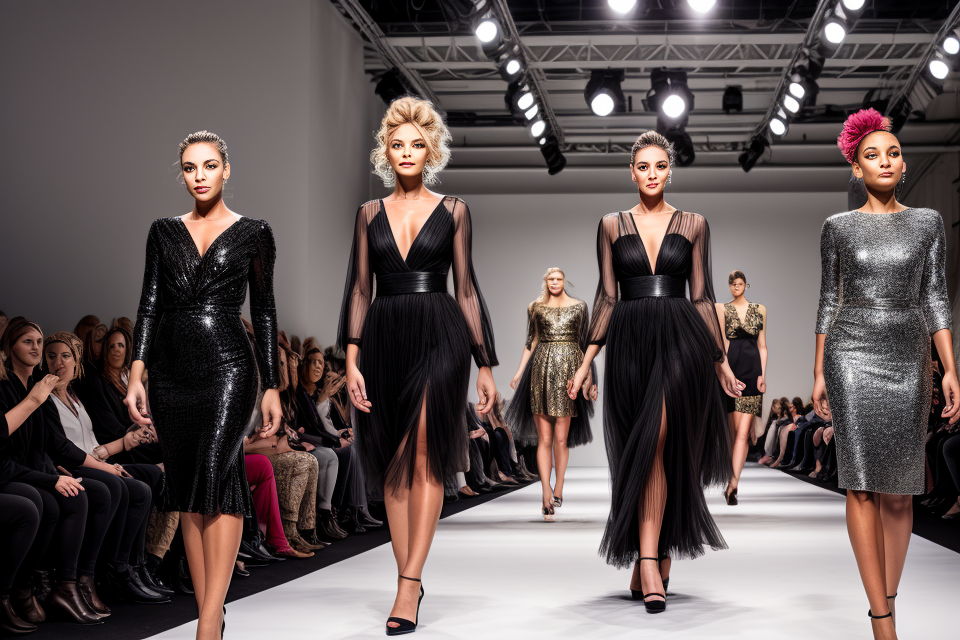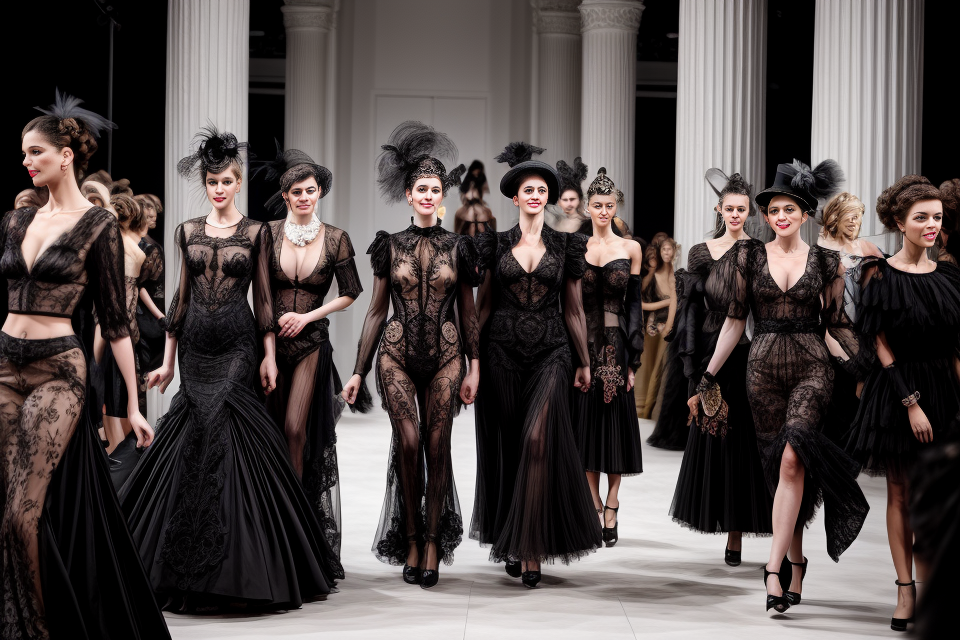The world of fashion is incomplete without the mention of Vogue. Vogue is a prestigious fashion magazine that has been a trendsetter for decades. One of the most anticipated events in the fashion industry is the runway show, where designers showcase their latest collections. But the question remains, does Vogue do runway shows? This topic is worth examining as it will provide insight into Vogue’s role in the fashion industry and its impact on the runway shows. So, let’s dive in to explore the fascinating world of Vogue and its association with runway shows.
Vogue’s History with Runway Shows
Early Vogue Runway Shows
The earliest Vogue runway shows were a departure from the traditional fashion show format of the time. While other fashion shows were often staged as private, invitation-only events, Vogue’s runway shows were public affairs, held in grand ballrooms or other large public spaces.
One of the earliest Vogue runway shows was held in 1941 at the Plaza Hotel in New York City. The show featured designs by some of the most prominent fashion designers of the time, including Coco Chanel, Jean Patou, and Elsa Schiaparelli. The event was significant because it marked the first time that Vogue had staged a runway show, and it set the stage for the magazine’s continued involvement in the fashion industry.
Another notable early Vogue runway show was held in 1947 at the Grand Ballroom of the New Yorker Hotel. This show, which was billed as a “Fashion Spectacle,” featured designs by more than 70 fashion houses and was attended by over 3,000 people. The show was notable for its innovative use of lighting and sound effects, which helped to create a dramatic and memorable experience for the audience.
Overall, the early Vogue runway shows were significant because they helped to establish the runway show as a key component of the fashion industry. By staging public events that showcased the latest designs from the world’s top fashion houses, Vogue helped to elevate the status of fashion and make it more accessible to a wider audience.
Vogue’s Decline in Runway Shows
Reasons for the decline
Vogue’s decline in runway shows can be attributed to several factors. One reason is the increasing commercialization of fashion, which has led to a focus on sales and profit margins over creativity and artistic expression. This shift has led to a focus on mass-market appeal, rather than catering to the tastes of a select few.
Another reason for the decline is the changing nature of the fashion industry itself. The rise of social media and e-commerce has disrupted traditional fashion cycles, and designers now have more opportunities to showcase their work outside of the traditional runway show format.
The impact on the fashion industry
Vogue’s decline in runway shows has had a significant impact on the fashion industry as a whole. With less exposure for up-and-coming designers, it has become more difficult for new talent to break through and gain recognition. This has led to a homogenization of the fashion industry, with established designers dominating the market and fewer opportunities for innovation and experimentation.
Furthermore, the decline of Vogue’s runway shows has also led to a decline in the prestige and influence of the fashion magazine itself. As the go-to source for fashion news and trends, Vogue’s decline in runway shows has left a void in the industry, and other publications have had to step in to fill the gap. This has led to a more fragmented and competitive fashion media landscape, with less influence and power concentrated in a single publication.
Vogue’s Current Stance on Runway Shows
Fashion Month and Vogue
How Vogue covers fashion month
Vogue, as a fashion magazine, plays a significant role in covering fashion month, which is a series of runway shows held in the fashion capitals of the world, including New York, London, Milan, and Paris. Vogue sends its editors and writers to attend these shows and report on the latest fashion trends, designs, and styles. They also collaborate with designers and brands to provide exclusive access to their runway shows and behind-the-scenes content.
The importance of fashion month for Vogue
Fashion month is an essential part of Vogue’s editorial calendar, as it allows the magazine to stay at the forefront of the fashion industry and maintain its position as a leading fashion publication. Vogue uses fashion month to discover new designers and emerging trends, which are then featured in the magazine and on its digital platforms. The magazine also uses fashion month to establish relationships with designers and brands, which can lead to exclusive interviews, features, and photo shoots.
Overall, Vogue’s coverage of fashion month is a critical aspect of the magazine’s editorial strategy, and it helps to shape the fashion industry’s narrative and influence the public’s perception of fashion trends.
New York Fashion Week and Vogue
As one of the biggest fashion events in the world, New York Fashion Week (NYFW) plays a significant role in shaping the fashion industry. Vogue, as a leading fashion magazine, also has a crucial role to play during NYFW. The magazine’s presence at the event is felt in various ways, from providing coverage of the shows to hosting parties and events of its own.
Vogue’s role at NYFW is multifaceted. The magazine covers the shows by sending its editors and writers to attend the runway shows and report on the latest trends and designs. Vogue also provides coverage of the shows through its social media channels, including Instagram and Twitter, where it shares behind-the-scenes photos and videos of the runway shows and backstage interviews with designers and models.
However, Vogue’s role at NYFW is not limited to just reporting on the shows. The magazine also plays a significant role in shaping the image of the event. Vogue hosts parties and events during NYFW, such as the annual Vogue party, which is attended by fashion industry insiders, celebrities, and designers. The magazine also collaborates with designers to create exclusive fashion shows and presentations that are featured in Vogue’s print and digital publications.
Despite the challenges and changes in the fashion industry, Vogue’s role at NYFW remains significant. The magazine’s presence at the event helps to maintain its status as a major player in the fashion world, and its coverage and events help to shape the image of the event and the industry as a whole.
However, as the fashion industry continues to evolve, Vogue must adapt to the changing landscape. The rise of social media and the decline of print media have forced Vogue to rethink its approach to fashion shows and other events. The magazine must find new ways to engage with audiences and stay relevant in a rapidly changing industry.
Overall, Vogue’s role at NYFW is crucial to the success of the event and the fashion industry as a whole. The magazine’s coverage, events, and collaborations with designers help to shape the image of the event and the industry, and its presence at the event helps to maintain its status as a major player in the fashion world.
Milan and Paris Fashion Weeks and Vogue
Vogue’s Presence in Milan and Paris
Vogue, as one of the most influential fashion magazines in the world, has a significant presence during Milan and Paris Fashion Weeks. The magazine’s editors and writers attend the runway shows of top designers and fashion houses, providing their unique perspectives and opinions on the latest fashion trends and styles. Vogue’s editors also collaborate with designers and brands to create editorial content that showcases their collections and highlights their design aesthetics.
Furthermore, Vogue often hosts parties and events during the fashion weeks, bringing together fashion industry insiders, celebrities, and other notable figures. These events serve as platforms for the magazine to promote its brand and engage with its audience, while also offering a venue for networking and socializing among industry professionals.
The Future of Vogue’s Involvement in These Events
As the fashion industry continues to evolve and adapt to changing consumer preferences and market trends, Vogue’s role in runway shows and fashion weeks has come under scrutiny. Some critics argue that the magazine’s presence in Milan and Paris has become too commercialized and focused on celebrity culture, detracting from the original purpose of fashion weeks as a platform for designers to showcase their creativity and innovation.
Despite these concerns, Vogue remains committed to its role as a leader in the fashion industry. The magazine has shown a willingness to adapt to changing times, experimenting with new formats and channels for disseminating fashion content. For example, Vogue has expanded its online presence, offering readers access to runway show coverage, behind-the-scenes content, and other exclusive material.
Moreover, Vogue has demonstrated a commitment to promoting diversity and inclusivity in the fashion industry, championing models and designers from diverse backgrounds and cultures. This commitment reflects a broader trend in the industry towards greater representation and inclusivity, as well as a recognition of the global nature of fashion and its impact on different cultures and communities.
Overall, while Vogue’s role in runway shows and fashion weeks may continue to evolve and adapt to changing industry trends and consumer preferences, the magazine remains a vital and influential force in the world of fashion.
Vogue’s Influence on the Runway Show Experience
The Impact of Vogue on Designers
How Vogue’s coverage affects designers
The fashion industry is highly competitive, and designers are constantly looking for ways to stand out and gain exposure. Vogue, as one of the most influential fashion magazines in the world, holds a significant amount of power in shaping the industry’s narrative. As a result, designers often go to great lengths to secure coverage in Vogue, as it can greatly impact their careers and brand recognition.
Vogue’s coverage can take many forms, including feature articles, editorial spreads, and runway show reviews. These features often have a significant impact on a designer’s reputation and can make or break their career. For example, if Vogue chooses to feature a designer in a spread or give their show a positive review, it can lead to increased exposure, more clients, and a boost in sales. On the other hand, if Vogue chooses to ignore a designer or give them a negative review, it can have a detrimental effect on their career.
The power of Vogue in the fashion industry
Vogue’s influence in the fashion industry is not to be underestimated. The magazine has been around for over a century and has established itself as a leader in fashion journalism. Vogue’s coverage has the power to make or break a designer’s career, and as a result, designers often go to great lengths to secure coverage in the magazine.
Vogue’s power in the industry extends beyond just designers. The magazine also has the power to shape the direction of fashion trends and influence consumer behavior. Vogue’s editorial choices and spreads often set the tone for the industry, and designers will often look to the magazine for inspiration and guidance. Additionally, Vogue’s coverage of runway shows can have a significant impact on which designers and trends gain popularity.
Overall, Vogue’s influence on the fashion industry cannot be overstated. The magazine’s coverage can have a significant impact on a designer’s career and the direction of fashion trends. As a result, designers will often go to great lengths to secure coverage in Vogue, as it can greatly impact their brand recognition and success in the industry.
The Impact of Vogue on Consumers
Vogue, as one of the most influential fashion magazines in the world, has a significant impact on consumers and their purchasing decisions. The magazine plays a crucial role in shaping consumer trends and preferences, and its influence is particularly evident during runway shows.
One of the ways Vogue influences consumers is by providing a platform for designers to showcase their collections. By featuring these collections in its pages, Vogue exposes readers to the latest fashion trends and styles, and encourages them to incorporate these looks into their own wardrobes. In turn, this can lead to an increase in demand for certain styles and products, and can ultimately drive sales for fashion brands.
In addition to showcasing designer collections, Vogue also plays a role in shaping consumer preferences by highlighting specific styles and trends. For example, the magazine may feature a particular color or fabric in multiple spreads, or may focus on a particular silhouette or design element. This can create a trend that is then reflected in the runway shows of other designers, and can ultimately influence the wider fashion industry.
Vogue’s influence on consumers is not limited to its print publications, however. The magazine’s website and social media channels also provide a wealth of information and inspiration for fashion lovers. From behind-the-scenes footage of runway shows to interviews with designers and models, Vogue’s online presence offers a unique and immersive look at the world of fashion.
Overall, Vogue’s influence on consumers is significant and far-reaching. By providing a platform for designers to showcase their collections, highlighting specific trends and styles, and offering a wealth of information and inspiration online, the magazine plays a crucial role in shaping the fashion industry and influencing consumer purchasing decisions.
The Future of Runway Shows and Vogue
As the fashion industry continues to evolve, the role of Vogue in runway shows remains a crucial aspect of the industry. With the rise of social media and digital platforms, the way fashion is consumed and perceived has changed drastically. In this section, we will examine the potential for change in the fashion industry and the role of Vogue in shaping the future of runway shows.
The Potential for Change in the Fashion Industry
The fashion industry is constantly evolving, and with the rise of new technologies and changing consumer preferences, it is important for brands to adapt to stay relevant. Some potential changes that could impact the future of runway shows include:
- Increased use of digital platforms for fashion shows, which could make the experience more accessible to a wider audience.
- Greater focus on sustainability and ethical practices, which could lead to a shift in the types of materials and production methods used in fashion.
- The growing importance of social media influencers and the role they play in shaping fashion trends.
The Role of Vogue in Shaping the Future of Runway Shows
As one of the most influential fashion magazines in the world, Vogue plays a significant role in shaping the future of runway shows. Some ways in which Vogue may influence the future of runway shows include:
- By promoting emerging designers and giving them a platform to showcase their work.
- By incorporating new technologies and digital platforms into the runway show experience.
- By emphasizing the importance of sustainability and ethical practices in the fashion industry.
Overall, the future of runway shows and Vogue is likely to involve a combination of traditional and modern elements, as the industry continues to evolve and adapt to changing consumer preferences and technological advancements.
FAQs
1. What is a runway show?
A runway show is a fashion event where models walk down a runway and showcase clothing and accessories from a designer or fashion house. These shows are often held during fashion week and are attended by industry professionals, buyers, media, and the general public.
2. Does Vogue organize runway shows?
Vogue, as a fashion magazine, does not organize runway shows. However, Vogue is a prominent media partner for many runway shows during fashion week. Vogue editors and writers attend these shows and provide coverage and analysis of the collections in the magazine and on their website.
3. How is Vogue involved in the fashion industry?
Vogue plays a significant role in the fashion industry as a leading fashion magazine. Vogue covers the latest fashion trends, styles, and designers, and provides editorial content and advertising for fashion brands. Vogue also has a strong presence on social media and hosts events and partnerships with fashion brands and designers.
4. Does Vogue cover runway shows?
Yes, Vogue covers runway shows and provides extensive coverage of the collections presented during fashion week. Vogue’s coverage includes articles, photos, and videos, and is widely read by fashion enthusiasts and industry professionals. Vogue’s coverage of runway shows helps to shape the conversation around fashion and influence the industry.
5. What is the role of Vogue in the fashion industry?
Vogue is a significant player in the fashion industry as a leading fashion magazine. Vogue sets trends and shapes the conversation around fashion through its editorial content, events, and partnerships. Vogue’s coverage of runway shows and designers helps to raise their profiles and influence the industry. Vogue’s influence on fashion is widely recognized and respected.


